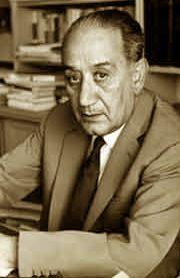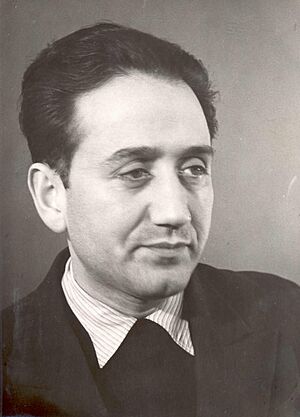Ignazio Silone facts for kids
Quick facts for kids
Ignazio Silone
|
|
|---|---|
 |
|
| Member of the Constituent Assembly | |
| In office 11 June 1946 – 31 January 1948 |
|
| Constituency | L'Aquila (XXI) |
| Personal details | |
| Born |
Secondino Tranquilli
1 May 1900 Pescina dei Marsi, Italy |
| Died | 22 August 1978 (aged 78) Geneva, Switzerland |
| Political party | PSI (1917-1921; 1930-1947) PCd'I (1921-1930) UdS (1948-1949) PSU (1949-1951) PSDI (1951-1954) Independent (1954-1978) |
| Occupation | Author, politician |
Ignazio Silone (born Secondino Tranquilli, May 1, 1900 – August 22, 1978) was an important Italian writer and political figure. He became famous during World War II for his strong novels that spoke out against Fascism, a type of strict government.
Silone was nominated for the Nobel Prize for Literature ten times. His books are still read today for their powerful messages about freedom and justice.
Contents
Early Life and Political Beginnings
Ignazio Silone was born into a farming family in Pescina, a town in the Abruzzo region of Italy. When he was young, he faced many challenges. His father died in 1911. In 1915, a big earthquake hit his hometown, and he lost many family members, including his mother.
After these difficult times, he left his hometown to finish high school. In 1917, Silone joined a youth group of the Italian Socialist Party (PSI). He quickly became a leader in this group.
In 1921, he helped create the Communist Party of Italy (PCd'I). He secretly became one of its leaders during the time of the Fascist regime in Italy. His brother, Romolo Tranquilli, was arrested in 1928 for being part of the Communist Party. Sadly, Romolo died in prison in 1931 due to severe beatings.
Speaking Out and Writing Novels
In 1927, Silone left Italy for a trip to the Soviet Union. He then settled in Switzerland in 1930. While in Switzerland, he disagreed with Joseph Stalin, the leader of the Soviet Union, and the Communist International group. Because of this, he was removed from the Communist Party of Italy. He then rejoined the Italian Socialist Party.
Silone faced health problems, including tuberculosis and severe depression. He spent almost a year recovering in clinics in Switzerland. During this time, a kind woman named Aline Valangin helped him and other people who had moved there.
As he got better, Silone started writing his first novel, Fontamara. It was published in German in 1933. The English version came out in 1934 and was very popular. People were interested in his book because of the Spanish Civil War and the growing tensions before World War II.
Resistance and Return to Italy
During World War II, Silone led a secret socialist group from Switzerland. This group helped resistance fighters in Nazi Germany-controlled Northern Italy. He also worked as a secret agent for the Office of Strategic Services (OSS), using the code name "Len."
The United States Army printed copies of his books Fontamara and Bread and Wine. They gave these books to Italians when Italy was being freed after 1943. These two books, along with The Seed Beneath the Snow, are known as the Abruzzo Trilogy.
Silone returned to Italy in 1944. Two years later, he was chosen to be a representative for the Socialist Party. He continued to be involved in different socialist groups for a few more years. However, after a failed attempt to be elected to the Senate in 1953, he decided to step away from active Italian politics.
Later Works and Awards
After contributing to a book called The God That Failed (1949), which was against communism, Silone joined the Congress of Cultural Freedom. He also edited a journal called Tempo Presente with Nicola Chiaromonte. In 1967, he found out that the journal was secretly funded by the United States Central Intelligence Agency. Because of this, Silone resigned and focused all his energy on writing novels and stories about his own life.
In 1969, he received the Jerusalem Prize. This award is given to writers who explore the idea of individual freedom in society. In 1971, he was also given the important Prix mondial Cino Del Duca award.
Personal Life
Ignazio Silone was married to Darina Laracy (1917–2003). She was an Irish student of Italian literature and a journalist. Ignazio Silone passed away in Geneva, Switzerland, in 1978.
Works
Novels
- Fontamara (1930)
- Un viaggio a Parigi (1934) (short stories)
- Pane e vino (1936)
- Il seme sotto la neve (1941)
- Una manciata di more (1952)
- Pane e vino (revised version, 1955)
- Il segreto di Luca (1956)
- La volpe e le camelie (1960)
- Severina (1981), finished after his death by Darina Silone
- The Abruzzo Trilogy: Fontamara, Bread and Wine, The Seed Beneath the Snow (2000)
Essays
- Il Fascismo. Origini e sviluppo (1934)
- La scuola dei dittatori (1938)
- Memoriale dal carcere svizzero (1942)
- The God that Failed (contribution) (1949)
- Uscita Di Sicurezza (1965)
- L'Avvenire dei Lavoratori (1945)
- A Conversation in Paris (1955)
- Mazzini, introductory essay (1939)
Three of Silone's poems were included by Hanns Eisler in his Deutsche Sinfonie, along with poetry by Bertolt Brecht.
Theater
- Ed egli si nascose (1944)
- L'avventura di un povero cristiano (1968)
Cinematic Versions
- A movie version of Fontamara, directed by Carlo Lizzani and starring Michele Placido, was released in 1977.
See also
 In Spanish: Ignazio Silone para niños
In Spanish: Ignazio Silone para niños
 | Misty Copeland |
 | Raven Wilkinson |
 | Debra Austin |
 | Aesha Ash |


